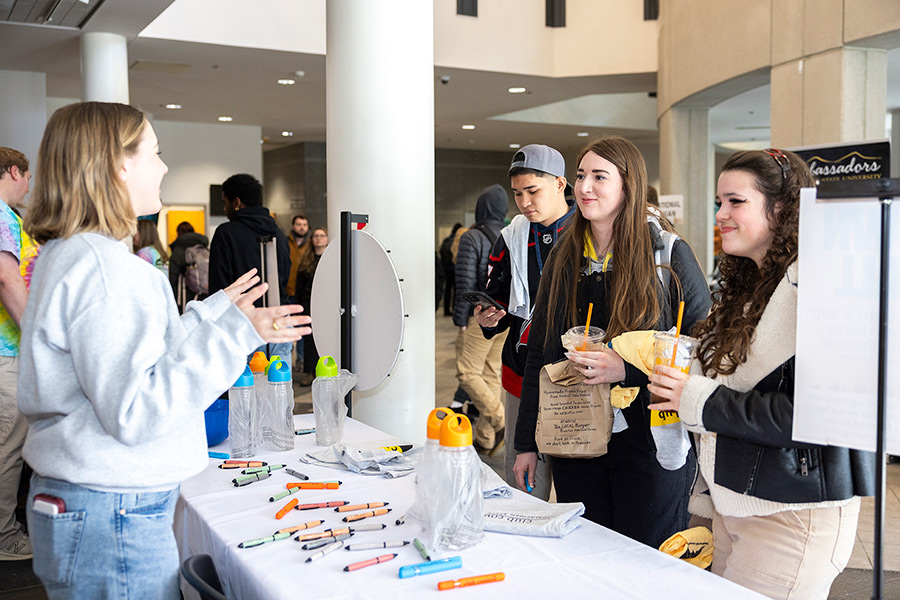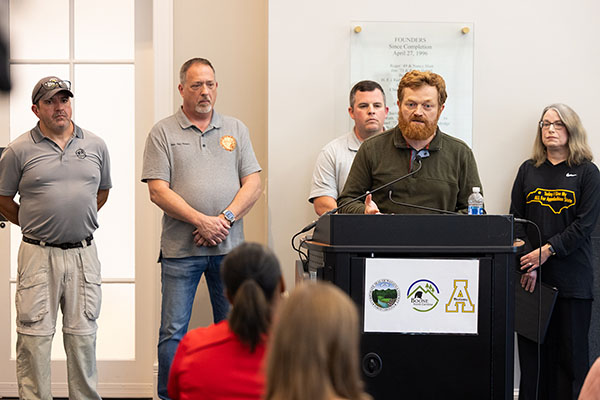BOONE, N.C. — Months after Hurricane Helene disrupted the fall semester, Appalachian State University announced a 2.2% increase in spring 2025 enrollment numbers compared with spring 2024 — a milestone achievement that University of North Carolina System leaders credit to an “all-hands effort” from faculty and staff, as well as state leaders.
The census day enrollment of 20,291 students represents a record spring enrollment at App State. In addition, the retention of first-year students from the fall to spring semester is 94.4%, a five-year high.
“This is particularly significant after the impacts of Hurricane Helene, and it demonstrates the tremendous efforts by our faculty and staff to ensure our students could succeed through an incredibly challenging semester,” said App State Interim Chancellor Heather Norris.
App State classes were canceled from Sept. 26 to Oct. 11, 2024, due to the impacts from Helene, which included widespread and unprecedented flooding, landslides, power and internet outages, and significant destruction, including washed-out roads, downed trees and damaged homes and businesses.
Disaster relief and comprehensive student support
In a Jan. 29 statement announcing spring enrollment gains at App State, the University of North Carolina Asheville and Western North Carolina, UNC System President Peter Hans credited the all-hands effort of university faculty and staff, along with heightened state support, for helping students return to campus and continue working toward graduation. Emergency funding from the North Carolina General Assembly allowed the universities to fix damaged infrastructure and boost financial aid.
“That public support makes a real difference in the lives of those students and the recovery of the mountains,” Hans said. “It speaks volumes about the strength of our universities and the people of Western North Carolina that Hurricane Helene has not stopped our students from pursuing their dreams.”
After the storm hit the area on Sept. 27, the App State Community worked quickly to extend disaster resources and support to students, faculty and staff. On Oct. 1, the university opened a comprehensive Disaster Resource Hub that provided affected students and employees with access to short-term bridge funds, as well as other critical resources, including: counseling services, academic assistance and support, housing assistance and support, legal assistance for students, financial aid assistance and insurance consultations.
The offices of University Housing, Off-Campus Student Services and Human Resources worked collaboratively to provide temporary and long-term housing resources to students and employees who were displaced from their housing, including rooms in on-campus residence halls for students and hotel rooms for faculty and staff.
With support from private donors, the App State Disaster Relief Fund raised and distributed over $4 million in bridge funding to meet immediate critical needs. Over 5,400 students, faculty and staff received bridge grants of up to $1,000 at the university’s Disaster Resource Hub.
App State also leveraged assistance offered by the state legislature and the UNC System. Emergency grants helped offset hurricane-related expenses for students, some of whom evacuated or lost belongings in the disaster. Students from hurricane-impacted counties but attending other state universities were also eligible for financial aid.
“We thank our legislature, the UNC System and our incredibly generous donors for providing funds to support our students’ and employees’ most urgent needs and their immediate steps toward recovery,” said Norris.
The university ensured that campus infrastructure and services were available to off-campus students, faculty and staff, including free meals, showers, laundry and internet access. And UNC System institutions across the state opened their facilities to App State students as well, offering health care, mental health, library and fitness centers for students who had returned home to areas unaffected by the storm.
“Our sister institutions provided critical resources, and the full power of the UNC System was behind us as we worked on the front lines of the recovery efforts,” Norris said.
As the university prepared to resume classes in October, faculty were provided with assistance to ensure learning outcomes could still be met after missing 15% of the semester’s instructional hours. Dropout prevention measures began immediately, and student support staff reengineered the withdrawal processes to put more intervention steps in place, ensuring advisors were actively reaching out and making sure students were aware of all options and resources available to them.
“Exceptional focus was placed on minimizing student attrition that commonly occurs following a historic weather event such as Helene. App State focused on providing comprehensive student support,” said App State Vice Chancellor of Enrollment Management Troy Johnson. “Even given the hurricane’s impacts, these intentional intervention efforts led to fewer students withdrawing than in the prior fall semester.”
Norris acknowledged that some students, faculty and staff are still navigating the impacts of the storm, and that recovery is a slow process.
“This process is not finished, and we are continuing to offer support in as many ways as we can,” she said.
What do you think?
Share your feedback on this story.
‘Unified approach’ key to recovery, says Boone mayor
About Appalachian State University
As a premier public institution, Appalachian State University prepares students to lead purposeful lives. App State is one of 17 campuses in the University of North Carolina System, with a national reputation for innovative teaching and opening access to a high-quality, cost-effective education. The university enrolls more than 21,000 students, has a low student-to-faculty ratio and offers more than 150 undergraduate and 80 graduate majors at its Boone and Hickory campuses and through App State Online. Learn more at https://www.appstate.edu.
















